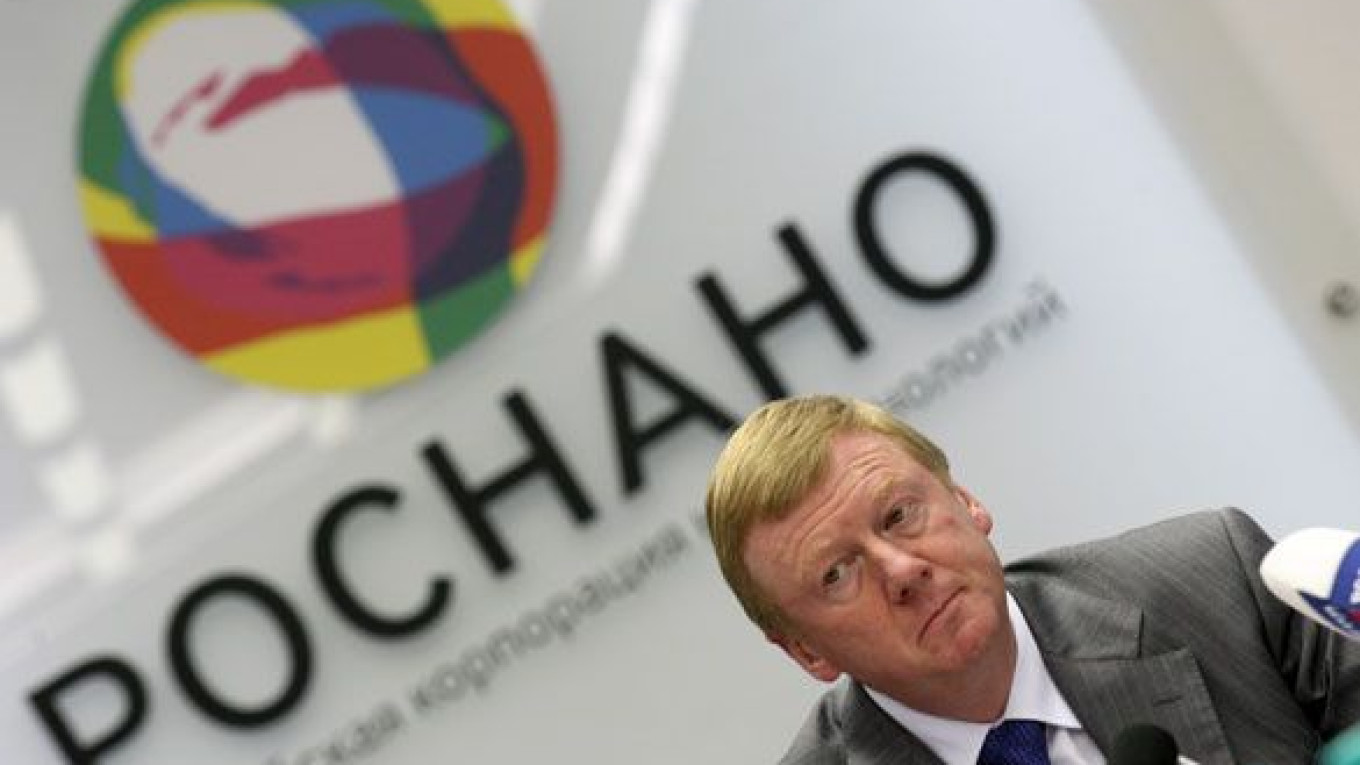A group of visiting U.S. fund managers heard a pitch Wednesday from Rusnano chief Anatoly Chubais, who sought to convince them that he could turn nanotechnology into a $30 billion industry by 2015.
Russian officials have been wooing foreign investment as part of their drive to modernize the economy through the development of new industries and innovative technologies. On Tuesday, President Dmitry Medvedev addressed the same group, saying Russia was ripe for investment because of its liberal financial regulation.
Chubais — an economic liberal best known in the West for his work on the country's privatizations — won polite endorsement from the delegation, which described the target of $30 billion in revenue as ambitious.
Reaching the figure is "our major task," Chubais said, adding that there are currently no official statistics on the industry's size. "It's definitely less than $1 billion."
The industry's revenue will reach $1.4 billion in 2011 and increase more than 10-fold to $14.5 billion by 2013, Chubais said in his presentation. By 2014, Russian nanotechnology enterprises will be bringing in $22.5 billion per year.
The state corporation, formed in 2007, has come under fire for its sluggish investment, including from Medvedev, who in May 2009 called it "a large structure that has a lot of money and that still has to understand how to correctly spend it."
Rusnano was also to be among the first of the state corporations to become a regular state-owned company. Medvedev has been critical of the state corporation model, which was created by then-President Vladimir Putin to combine commercial and regulatory functions.
But Chubais said the transformation would come by Jan. 1, 2011, a deadline he called "tough, but realistic" in a meeting with Medvedev in March.
The corporation is considering a number of options for its future development, including an initial public offering, Chubais told reporters.
"We're thinking of ways to raise additional investments, to increase the inflow of smart money to be invested in the Russian nanotech industry," he said, adding that an IPO would not be before 2013 or 2014.
Wednesday's meeting came as the Federation Council approved a bill enabling Rusnano to issue bonds and take loans under the state guaranties, which Chubais said was very important.
"We will have a lot of money. We don't know what to do with it," he said jokingly, drawing laughter among the delegation.
Rusnano received approval for 160 billion rubles ($5.1 billion) in state guarantees, he told reporters after the meeting.
Chubais said in February that Rusnano might issue bonds for as much as 40 billion rubles this year.
There's no comprehensive plan for making Russia's economy innovative, but the government has "a deep understanding" that modernization is a challenge for the coming decade, Chubais said.
With an investment stash of 130 billion rubles, Rusnano has already made some successful steps toward its $30 billion goal, he said. The corporation has 76 nanotechnology projects in 27 regions, with total investment of $8 billion, including $3.5 billion from Rusnano.
Rusnano also could co-invest in nanotechnology projects with U.S. funds.
"The first meeting is unlikely to finish with the contracts signed, but at the same time, I hope that it will finish with agreements on signing such contracts," he said.
The corporation invests as little as $10 million in some projects, Chubais said in response to a question from one of the executives.
Speaking after Chubais' presentation, the fund managers were positive on possible cooperation, although many noted that Rusnano's $30 billion target might take more than five years to achieve.
"When you're going in big opportunities like this, things will get done but not always on the time schedule that you predict. There are lots of risks and challenges along the way," said Brian Dovey, a partner with Domain Associates, which has $2.5 billion of capital under management.
The goal is "very ambitious but possible," he said.
"Russia is on its way to becoming a very interesting geography for foreign investors. … Rusnano is really developing the best practices for successful venture capital in Russia," said Peter Loukianoff, managing partner at Almaz Capital Partners, which has offices in Moscow and Silicon Valley.
"We're looking for very large returns …? and we look forward to further cooperation," he said.
Analysts cautioned that Rusnano could have a tougher ride if financial markets begin to tighten again.
"It will be harder for nanotechnology companies to raise investments, since it's a capital-intensive industry," said Vladislav Kochetkov, an analyst at Finam.
"The [revenue] forecast looks realistic enough. There are already a number of companies that use nanotechnology in their production and demonstrate positive financial results," he told The Moscow Times. "The infrastructure for nanotech firms to raise capital will gradually develop."
A Message from The Moscow Times:
Dear readers,
We are facing unprecedented challenges. Russia's Prosecutor General's Office has designated The Moscow Times as an "undesirable" organization, criminalizing our work and putting our staff at risk of prosecution. This follows our earlier unjust labeling as a "foreign agent."
These actions are direct attempts to silence independent journalism in Russia. The authorities claim our work "discredits the decisions of the Russian leadership." We see things differently: we strive to provide accurate, unbiased reporting on Russia.
We, the journalists of The Moscow Times, refuse to be silenced. But to continue our work, we need your help.
Your support, no matter how small, makes a world of difference. If you can, please support us monthly starting from just $2. It's quick to set up, and every contribution makes a significant impact.
By supporting The Moscow Times, you're defending open, independent journalism in the face of repression. Thank you for standing with us.
Remind me later.


